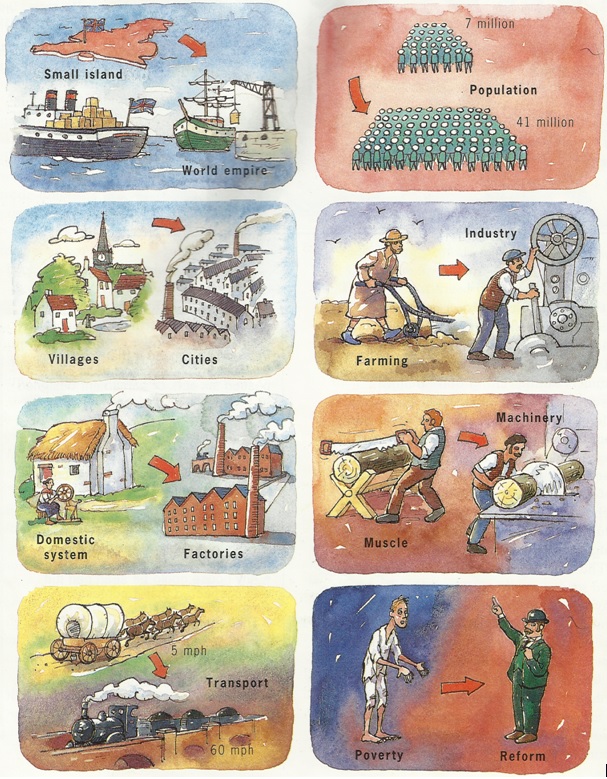
An Age of Change

Introduction

In the years between 1700 and 1914, Britain changed. These were the years of revolution turning round'), when people's lives were altered in many ways.
Britain, a small island kingdom in 1700, had become by 1914 the greatest trading nation on earth, with a worldwide empire (see Chapter 2).
During this period, there was a huge growth in population. It rose from about 6 million to 41 million. With this went a change in where people lived. Most people no longer lived in the villages and small market towns of the south of England; they lived in the great industrial towns of the north (see Chapter 3).
In 1700, Britain's economy was mainly agricultural; by 1914 an 'Industrial Revolution' had made Britain the first industrial nation, and 'the workshop of the world' (see Chapter 4). The 'Industrial Revolution' had many aspects. People stopped working at home on their simple hand-operated machines; by 1914 most manufactured goods were made in factories, and workers' lives were dominated by the factory chimneys and the factory clock.
Along with this went a revolution in power. In 1700, the main forms of power were clockwork and muscle power; by 1914 these had been replaced by steam power, electricity and the petrol engine. At the same time there was a revolution in transport. Horse-drawn wagons lumbering along muddy roads gave way to steam trains rushing along railway lines at 60 miles an hour.
Finally, these were the years which saw great reforms in industry and society (see Chapter 5). They were the years when slavery was abolished, when ordinary men got the vote and the right to join a trade union, and when the government passed laws to improve conditions in the-factories and the cities. By the end of the nineteenth century, women also were campaigning for the vote and for equal rights with men.
After you have studied this webpage, answer the question sheet by clicking on the 'Time to Work' icon at the top of the page.
Links:
The following websites will help you research further:
An Age of Change:
•
BBC website on
the changes of the 19th century
• A simple video
![]()
![]()
1 Changes in Everyday Life
This comment on the changes in Britain in the first half of the 19th century was written by the Reverend Sydney Smith (1771-1845).
A young man, alive at this period, hardly knows what improvements of human life ... have taken place in England since I was born – a period amounting now to nearly seventy-three years.
Gas was unknown: I groped about the streets of London in all but utter darkness... I had no umbrella! There were no waterproof hats. I could not keep my underwear in its proper place, for braces were unknown...
There were no banks to take the savings of the poor; and, whatever miseries I suffered, I had no post to whisk my complaints for a single penny to the remotest corners of the empire.